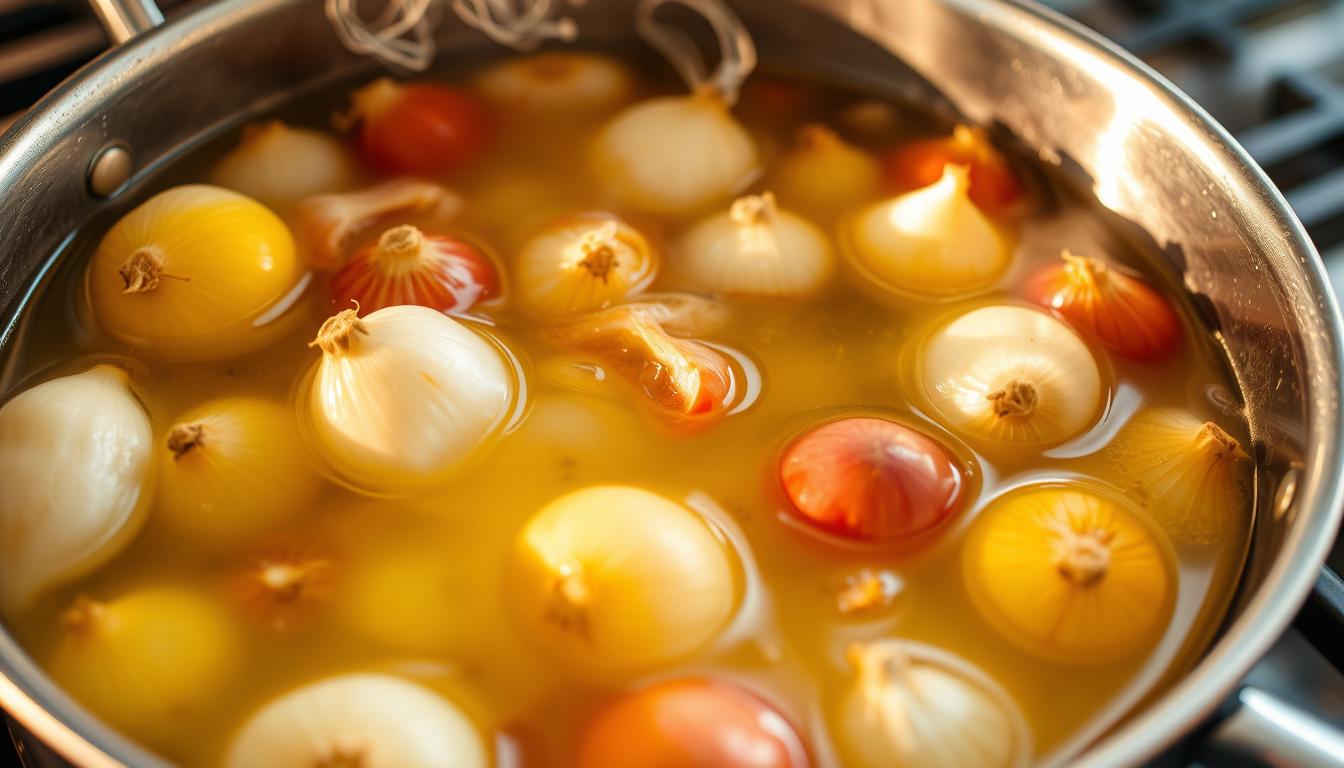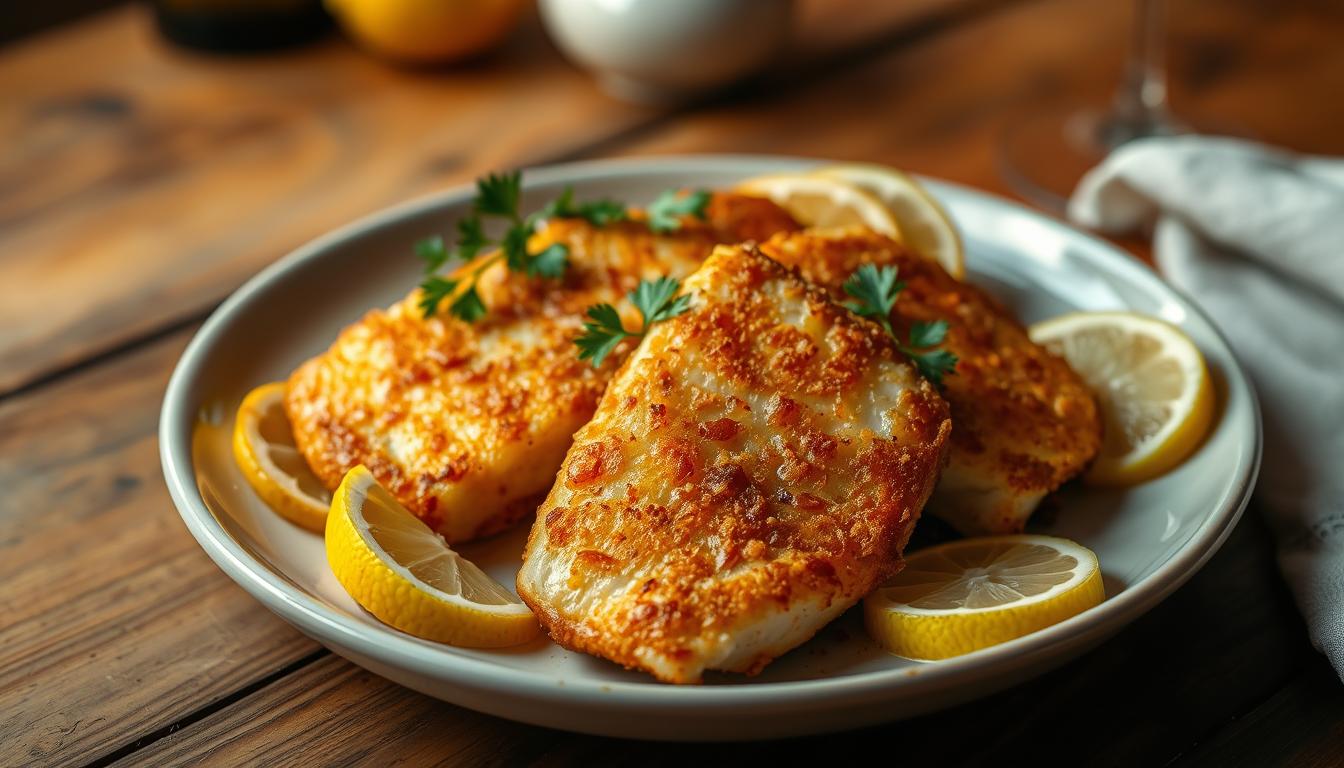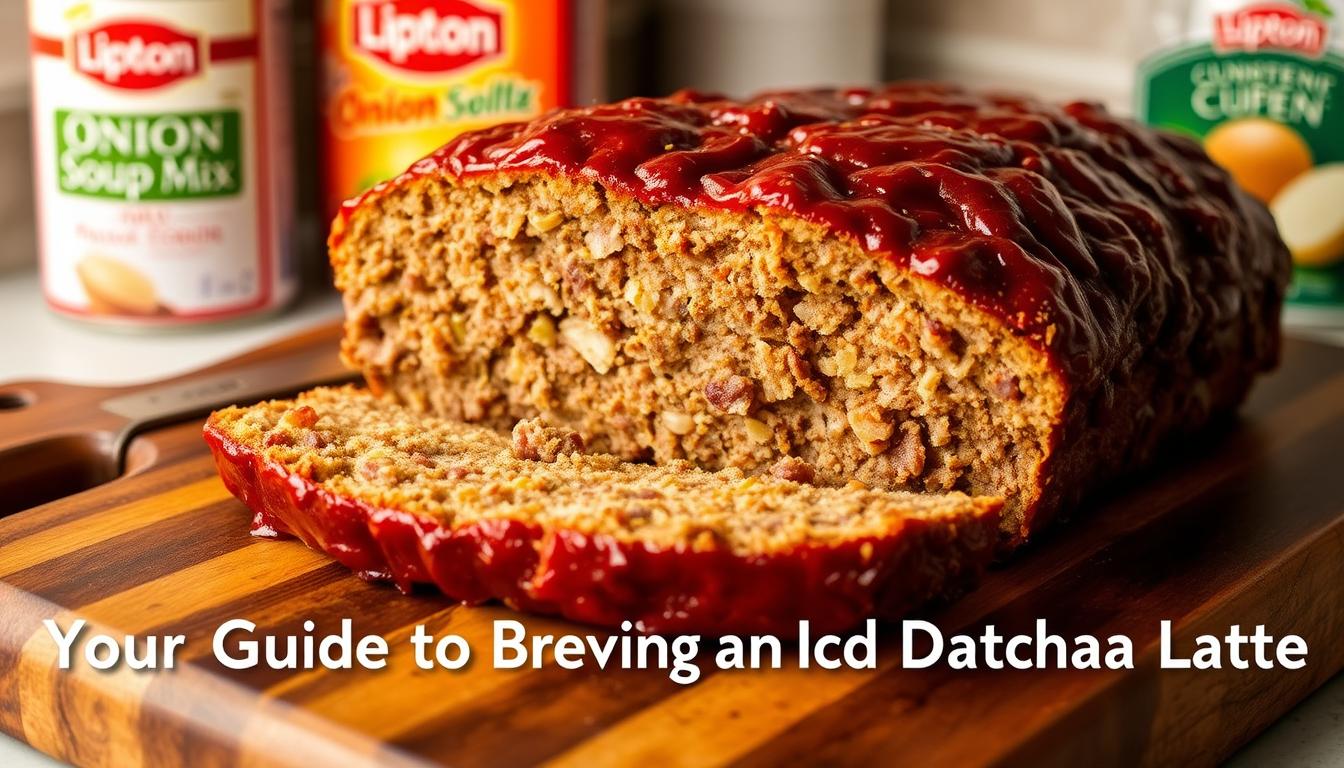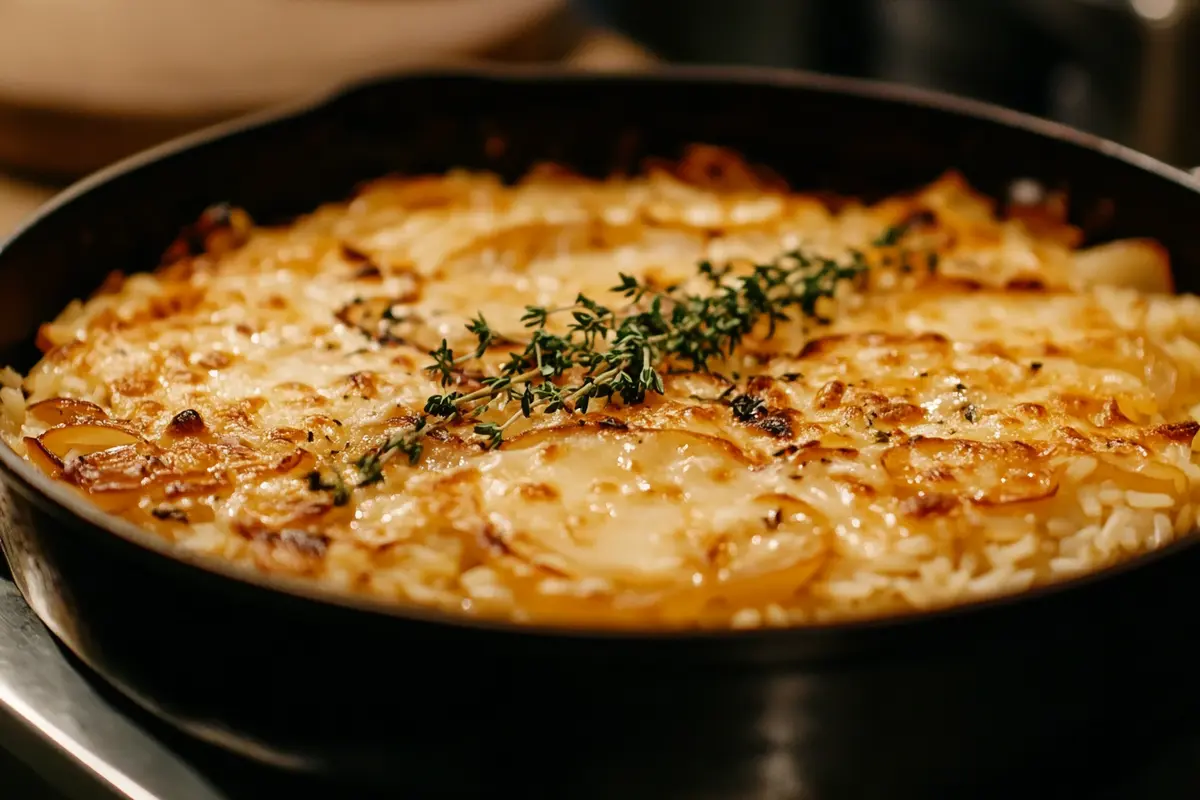Ready to boost your cooking skills with a tasty onion boil recipe? This classic dish is great for any event. With our help, you’ll make a dish that will wow your loved ones.
Creating a homemade onion boil is easier than you might think. Just a few ingredients and some tips from us, and you’re set for a dish to remember. Our homemade onion boil recipe is straightforward. It’s made to help you get perfect results every time.
Key Takeaways
- Learn how to make a delicious onion boil that’s perfect for any occasion
- Discover expert tips and tricks to elevate your culinary skills
- Understand the simple ingredients required for a mouth-watering homemade onion boil
- Follow our easy-to-follow recipe for perfect results every time
- Impress your family and friends with a truly unforgettable dish
What Is an Onion Boil?
An onion boil is a hearty dish that focuses on onions. It often includes other ingredients to boost flavor and nutrition. This meal is simple to make and can be customized with many ingredients.
Definition and Origins
The onion boil started as a simple dish using onions. Onions were chosen for their taste and health benefits. Over time, it became a beloved comfort food, loved for its simplicity and taste.
“Onions, when boiled, bring out a sweetness that pairs well with a variety of flavors,” says a chef. This makes onion boils great for trying new seasonings and ingredients. The exact origins are unclear, but it’s clear it’s a hearty, easy meal.
Popular Varieties
There are many onion boil varieties, each with its own taste and ingredients. Some favorites include:
- Cajun Onion Boil: This version is known for its bold flavors, thanks to spices and andouille sausage.
- Simple Onion Boil: This recipe focuses on the sweetness of onions, with just a few seasonings.
- Seafood Onion Boil: This adds seafood like shrimp or crab, making it even more flavorful and nutritious.
These variations show how onion boils can fit into many different cuisines and tastes.
Nutritional Benefits
Onion boils are not just tasty; they’re also good for you. Onions are full of antioxidants and have anti-inflammatory properties. Adding vegetables and lean proteins makes them a complete meal. You can also adjust the ingredients to meet your dietary needs.
As Bon Appétit points out, “onions are a powerhouse of nutrition, providing a significant amount of fiber, vitamins, and minerals.” Adding onion boils to your meals can be a delicious way to get more nutrients.
Essential Ingredients for Your Onion Boil
The secret to a flavorful onion boil recipe is in the ingredients. To make a standout dish, pick the right parts.
Choosing the Onions
Onions are the heart of any onion boil. For the best onion boil recipe, pick firm onions with a sweet taste. Vidalia or Texas Sweet Onions are great because they’re naturally sweet.
Additional Flavor Enhancers
There are many ingredients that can make your boil taste better. Think about adding:
- Garlic for a rich flavor
- Lemons or vinegar for a bit of tanginess
- Herbs like thyme or parsley for freshness
- Spices such as cayenne pepper or paprika for a kick
These add-ons not only boost flavor but also make the dish more interesting.
Tools You’ll Need
Having the right tools is key for making an onion boil smoothly. You’ll need:
| Tool | Purpose |
|---|---|
| Large Pot | For boiling the onions and other ingredients |
| Colander | For draining the boiled ingredients |
| Cutting Board | For preparing ingredients before boiling |
Using the right tools can greatly improve your cooking experience. It makes your onion boil both tasty and simple to make.
Step-by-Step Guide to Cooking an Onion Boil
Making the perfect onion boil is simple with our guide. It just takes a few easy steps to get a tasty dish every time.
Preparing Your Onions
To start your easy onion boil recipe, prepare your onions first. Peel and chop them as you like. The chop size depends on your texture preference.
- Choose fresh, firm onions for the best flavor.
- Peel the onions and chop them into your desired size.
- Rinse the chopped onions under cold water to remove any excess dirt.
Boiling Process Explained
The boiling process is key for the right consistency. Here’s how to do it:
- Bring a large pot of water to a boil.
- Add your chopped onions and any desired additional ingredients (like garlic or spices).
- Reduce the heat to a simmer and let cook until the onions are tender.
Tips for Perfectly Cooked Onions
For perfectly cooked onions, follow these tips:
| Tip | Description |
|---|---|
| Monitor the heat | Keep the heat at a simmer to prevent the onions from becoming too soft. |
| Check for tenderness | Regularly check the onions for tenderness. The cooking time may vary based on the onion size and type. |
| Season to taste | Add salt or other seasonings as needed to enhance the flavor. |
By following these steps and tips, you’ll make a quick onion boil recipe that’s delicious and satisfying. Enjoy the process and the tasty results!
Flavoring Your Onion Boil
Make your onion boil stand out by adding spices and ingredients. This step turns a simple boil into a delicious dish.
Spices That Pair Well
Some spices really bring out the onion flavor. Try adding paprika, garlic powder, or onion powder for more taste. For a spicy touch, use cayenne pepper or red pepper flakes. These spices add heat and depth to your onion boil.
Adding Vegetables and Proteins
Adding different veggies and proteins makes your onion boil better. Try smoked sausage, chicken, or bacon for protein. For veggies, carrots, potatoes, and celery are great. They add flavor and make the dish more filling.
Making a Flavorful Broth
A good broth is key to a tasty onion boil. Start with chicken or vegetable stock. Then add onions and other ingredients. You can also use bouillon cubes or simmer it longer to get more flavors.
For a spicy onion boil recipe, add more cayenne pepper or hot sauce. For a flavorful onion boil recipe, layer flavors by adding spices and ingredients at different times.
Customizing Your Onion Boil
You can make your onion boil your own by changing the ingredients and seasonings. This way, it fits your taste and dietary needs.
Creating a Spicy Version
Want a spicy onion boil? Add chili peppers or hot sauce. Cayenne pepper or red pepper flakes can also add flavor.
Tips for a Spicier Onion Boil:
- Add sliced jalapeños or serrano peppers to the boil.
- Use spicy sausage or chorizo for a meaty, spicy taste.
- Try different hot sauces like sriracha or Frank’s RedHot.
Sweet Variations to Try
For a sweeter onion boil, add ingredients that balance the savory flavors. Caramelize the onions first for a deep, sweet taste.
Ideas for a Sweeter Onion Boil:
- Caramelize the onions with brown sugar before boiling.
- Add sweet potatoes or carrots for natural sweetness.
- Use a sweet broth, like apple cider or maple syrup.
Vegetarian and Vegan Options
Vegetarians and vegans can easily make the onion boil fit their diet. Just swap or skip certain ingredients.
| Dietary Preference | Modifications |
|---|---|
| Vegetarian | Make sure the broth is veggie-based; add veggies or tofu for protein. |
| Vegan | Leave out animal products like dairy and honey; use vegan broth and seasonings. |
With these simple changes, you can enjoy a tasty onion boil that meets your dietary needs.
Common Mistakes to Avoid
Making an onion boil can be tricky, but knowing what mistakes to avoid can make all the difference. When preparing this traditional dish, there are several common errors that can affect the flavor and texture of your best onion boil recipe.
Overcooking Onions
One of the most common mistakes when making an onion boil is overcooking the onions. This can result in a mushy, unappetizing texture that’s more akin to a paste than a tender, flavorful ingredient. To avoid this, monitor the cooking time closely and check the onions frequently towards the end of the cooking process.
Using the right type of onion can also help prevent overcooking. Some onion varieties hold their shape better when cooked, making them ideal for an onion boil.
Skipping Ingredient Preparation
Another mistake that can compromise your traditional onion boil recipe is skipping ingredient preparation. Properly choping your onions, for example, ensures they cook evenly and blend well with other ingredients. Neglecting to prepare your ingredients can lead to an unbalanced flavor and unappealing texture.
Take the time to prepare each component of your onion boil according to your recipe’s instructions. This attention to detail will pay off in the quality of your finished dish.
Not Seasoning Enough
Not seasoning your onion boil adequately is another common mistake. Onions are flavorful, but they need additional seasoning to bring out their full potential. Taste your onion boil as you go and adjust the seasoning accordingly.
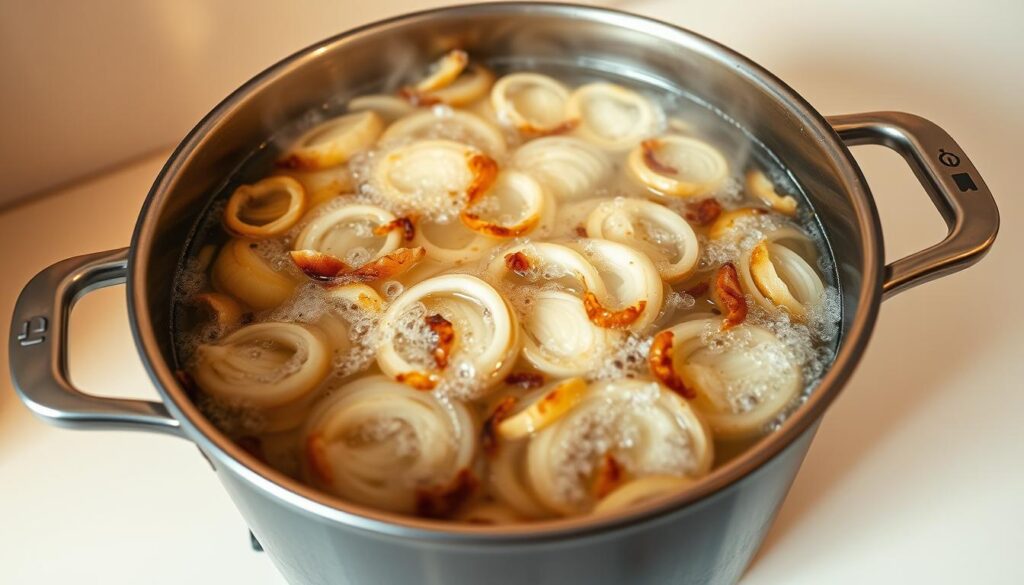
| Common Mistakes | Consequences | Prevention Tips |
|---|---|---|
| Overcooking Onions | Mushy texture, loss of flavor | Monitor cooking time, check onions frequently |
| Unbalanced flavor, unappealing texture | Properly chop onions, prepare ingredients according to recipe | |
| Not Seasoning Enough | Flat, unappetizing flavor | Taste as you go, adjust seasoning accordingly |
By avoiding these common mistakes, you can create a delicious and satisfying onion boil that showcases the best of this traditional onion boil recipe. Whether you’re new to making onion boils or looking to refine your technique, being mindful of these potential pitfalls will help you achieve a superior result.
Serving Suggestions for Your Onion Boil
Now that you’ve learned how to cook an onion boil, it’s time to think about how to serve it. Serving your onion boil can make your meal more enjoyable, whether it’s for a casual get-together or a fancy event.
Best Side Dishes to Complement
Choosing the right side dishes can make your onion boil even better. Try serving it with:
- Crusty bread for a cozy, comforting meal
- Roasted vegetables for a splash of color and extra nutrients
- Grilled meats for a hearty, filling dinner
For an easy onion boil recipe, pair it with a simple green salad or sautéed spinach.
Pairing with Beverages
The right drink can enhance the flavors of your onion boil. Some good options include:
| Beverage | Description |
|---|---|
| Beer | A crisp, hoppy beer goes well with the rich onion boil flavors |
| Wine | A dry white wine can balance the richness of the dish |
| Iced Tea | A refreshing, unsweetened tea offers a nice contrast to the savory onion boil |
For a flavorful onion boil recipe, try pairing it with a glass of wine or a craft beer.
“The art of pairing food with beverages is a sensory experience that can elevate any meal.”
Presentation Tips
Presentation is key to making your onion boil look good. Here are some tips:
- Garnish with fresh herbs for a splash of color
- Use a decorative serving dish to add visual appeal
- Arrange the onions and other ingredients artfully
By following these tips, you can make a visually appealing and delicious onion boil that will wow your guests.
Storing Leftovers
Storing leftovers from your quick onion boil recipe is easier than you think. Proper storage techniques will help you enjoy your homemade onion boil recipe for days to come.
Proper Storage Techniques
To store your leftover onion boil, use an airtight container. This prevents moisture and other flavors from affecting the dish. You can store it in the refrigerator for up to 3-4 days.
Refrigeration Tips:
- Cool the onion boil to room temperature before refrigerating.
- Use shallow containers to help the dish chill faster.
- Label the containers with the date and contents.
Reheating Tips
Reheating your leftover onion boil is straightforward. You can reheat it on the stovetop or in the microwave.
Stovetop Reheating:
- Place the onion boil in a saucepan over low-medium heat.
- Stir occasionally until heated through.
Microwave Reheating:
- Transfer the onion boil to a microwave-safe bowl.
- Cover the bowl with a microwave-safe lid or plastic wrap.
- Heat on high for 1-2 minutes, or until heated through.
Creative Ways to Use Leftovers
Don’t let your leftover onion boil go to waste. Here are some creative ways to repurpose it:
| Dish | Description |
|---|---|
| Onion Boil Soup | Use the leftover onion boil as a base for a hearty soup. |
| Onion Boil Casserole | Mix the leftover onion boil with other ingredients like pasta, cheese, and breadcrumbs, and bake until golden brown. |
| Onion Boil Fritters | Chop the leftover onion boil and mix it with some flour and egg. Shape into patties and fry until crispy. |
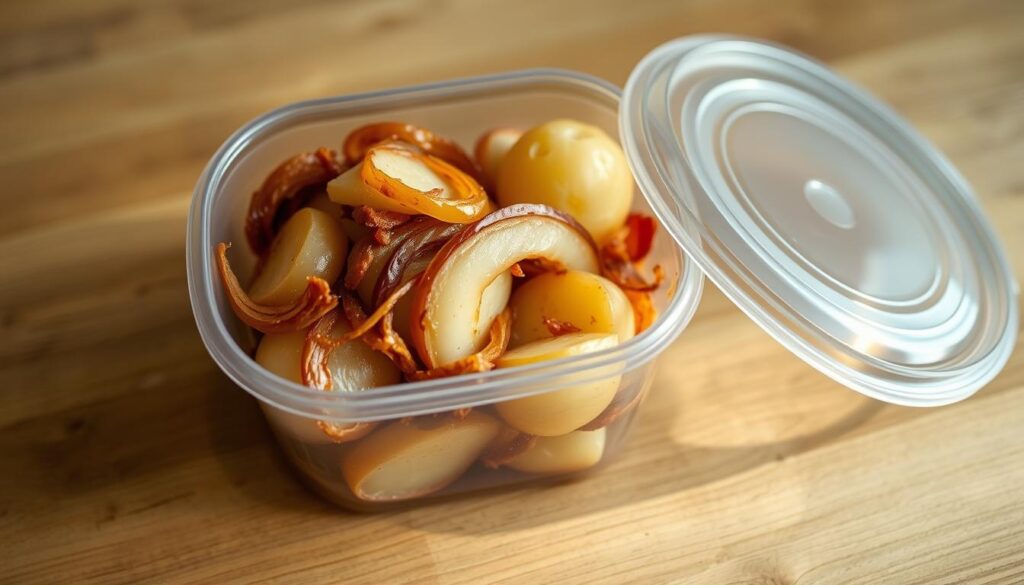
By following these storage and reheating tips, you can enjoy your homemade onion boil recipe for days to come. Get creative with your leftovers and reduce food waste!
Frequently Asked Questions
Exploring onion boils can raise some questions. We’ll cover common ones to help you enjoy your onion boil recipe more.
Shelf Life and Storage
An onion boil can last 3 to 5 days in the fridge. For longer storage, freeze it. A frozen onion boil stays flavorful like a fresh one.
Freezing and Reheating
Yes, you can freeze onion boils. Put it in airtight containers or freezer bags for up to 3 months. Reheat it gently over low heat, adding liquid if it’s too thick.
Substituting Ingredients
Missing an ingredient? No problem. You can swap or adjust to taste. Try shallots instead of onions or add jalapeños for a spicy twist.
FAQ
What is the best onion boil recipe for a beginner?
A simple onion boil recipe is great for beginners. It includes onions, garlic, and your choice of protein or veggies. Start with a basic recipe and tweak it to your liking.
How do I make a spicy onion boil recipe?
To spice up your onion boil, add diced jalapenos or serrano peppers. You can also use spicy seasonings like cayenne pepper. For more heat, add spicy sausage or hot sauce.
Can I customize my onion boil recipe to suit my dietary needs?
Yes, you can tailor your onion boil to fit your diet. For a vegetarian or vegan option, use plant-based proteins. For a gluten-free version, choose gluten-free seasonings.
How long does an onion boil last in the fridge?
An onion boil can stay fresh for 3 to 5 days in the fridge. Store it in an airtight container. Always reheat it to a safe temperature before eating.
Can I freeze onion boil leftovers?
Yes, you can freeze onion boil leftovers. Cool them down, then put them in an airtight container or freezer bag. Store in the freezer for up to 3 months. Reheat to a safe temperature before serving.
What are some creative ways to use leftover onion boil?
There are many ways to use leftover onion boil. Try making onion boil soup or stew. It’s also great as a topping for baked potatoes or nachos. Add it to omelets, frittatas, or breakfast burritos.
How do I reheat onion boil leftovers?
To reheat onion boil leftovers, place them in a pot or microwave-safe container. Heat over low-medium heat, stirring often, until warm. You can also reheat in the oven or microwave.

